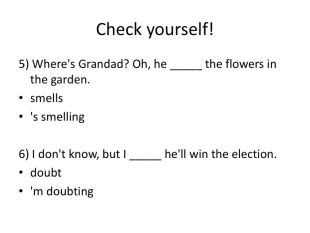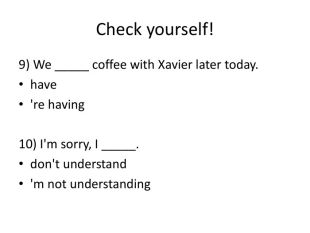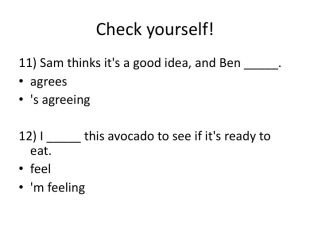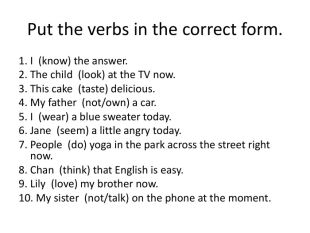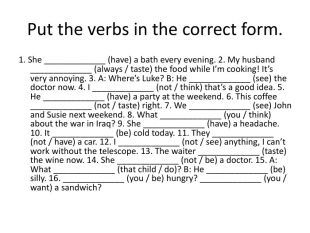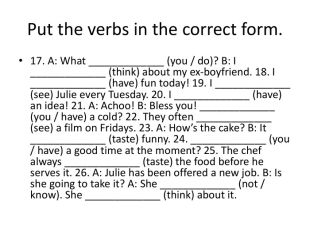Презентація з теми "Дієслова стану".





























State or Stative Verbs. Stative verbs describe a state rather than an action. They aren't usually used in any of the continuous forms. I don't know the answer. I'm not knowing the answer. She really likes you. She's really liking you. He seems happy at the moment. He's seeming happy at the moment.
Stative verbs often relate to: Thoughts and opinions: agree, believe, doubt, guess, imagine, know, mean, recognise, remember, suspect, think, understand. Feelings and emotions: dislike, hate, like, love, prefer, want, wish. Senses and perceptions: appear, be, feel, hear, look, see, seem, smell, taste. Possession and measurement: belong, have, own, possess, measure, weigh. Other verbs like this include: agree, appear, doubt, feel, guess, hear, imagine, look, measure, remember, smell, weigh, wish
Verbs that are sometimes stative. A number of verbs can refer to states or actions, depending on the context. I think it's a good idea. Wait a moment! I'm thinking. The first sentence expresses an opinion. It is a mental state, so we use present simple. In the second example the speaker is actively processing thoughts about something. It is an action in progress, so we use present continuous.
Verbs that are sometimes stativehave I have an old car. (state – possession)I'm having a quick break. (action – having a break is an activity)see Do you see any problems with that? (state – opinion)We're seeing off Mr Smith at the station tomorrow afternoon . (action – we're meeting him)
Verbs that are sometimes stativetaste This coffee tastes delicious. (state – our perception of the coffee)Look! The chef is tasting the soup. (action – tasting the soup is an activity)be He's so interesting! (state – his permanent quality)He's being very unhelpful. (action – he is temporarily behaving this way)
Study the difference. Be be is usually a stative verb, but when it is used in the continuous it means 'behaving' or 'acting‘ you are stupid = it's part of your personality you are being stupid = only now, not usually. Think think (stative) = have an opinion. I think that coffee is great think (dynamic) = consider, have in my headwhat are you thinking about? I'm thinking about my next holiday. Have have (stative) = own. I have a car have (dynamic) = part of an expression. I'm having a party / a picnic / a bath / a good time / a break. See see (stative) = see with your eyes / understand. I see what you mean. I see her now, she's just coming along the road see (dynamic) = meet / have a relationship with. I've been seeing my boyfriend for three years. Taste taste (stative) = has a certain taste. This soup tastes great. The coffee tastes really bitter taste (dynamic) = the action of tasting. The chef is tasting the soup('taste' is the same as other similar verbs such as 'smell')
Study the difference. I feel sick. (This is a state verb that means 'I am sick / I think I am sick.' There is no action here). I am feeling the top of the desk. (This is an action verb that means 'I am using my hands to touch the desk to see how it feels.' This is an action.)This smells bad. (= State verb that means 'this has a bad smell '-- there is no action here.)I am smelling the flower. (= Action verb that means 'I am sucking in air through my nose to get the smell of the flower.')This tastes salty. (= State verb that means 'it has a salty taste.')I am tasting the strawberry. (= Action verb that means 'I am using my mouth and tongue to learn how something tastes.')
Study the difference. The verb think has a state meaning and an action meaning as well. Let's look at two examples. I think blue is a nice color. (State verb: I believe blue is nice / In my opinion, blue is nice.)I am thinking of the answer. (Action verb: I am using my brain to try to find the answer.)So, think is a state verb when we use it to give an opinion, but it is an action verb when we describe our brain in action. There are a few other exceptions as well, such as idioms with the verb have. When have means to possess something, e.g. I have a pen, we can never use the verb in an ~ing (progressive form). But there are some idioms with have that are actions. For example: She's having a baby. (to have a baby = to give birth)I'm having a party/picnic tomorrow. (to have a party/picnic = to host a party/picnic)We're having trouble. (to have trouble = to do something with difficulty)I'm having fun / I'm having a good time.. (to have fun / have a good time= to enjoy yourself)
Stative Verbs. Some verbs are not usually used in their continuous forms, i.e. in present continuous, past continuous , perfect continuous etc. They are called stative verbs. The most common stative verbs are:{5 C22544 A-7 EE6-4342-B048-85 BDC9 FD1 C3 A}Love hatelikewantwishpreferbelieveimaginedoubtunderstandmean rememberforget needappearseem. Have (own) possessowndepend ofbelong to
Stative Verbs that can change their meaning and turn into the verbs denoting action not a state.{5 C22544 A-7 EE6-4342-B048-85 BDC9 FD1 C3 A}verb. Stative meaning / use. Non-stative meaningbe. Used for states rather than actionse.g. It is 3 o’clock. Used for temporary behaviour and action at the present time.e.g. You are being lazy.have. Possess, own; experience an emotion, sensation, state,etc.e.g. I have pink hair at the moment. Used for actions.e.g. I’m having a bath at the moment.feel. Have an opinion, believe.e.g. I feel that we get too much homework. Touch, experience an emotion, sensation, etc.e.g. I’m feeling a bit ill today.think. Have an opinion, believee.g. What do you think about our new teacher?Consider, use your brain.e.g. What are you thinking about?
One more list of stative verbs. Like, know, belong, love, realise, fit, hate, suppose, contain, want, mean, consist, need, understand, seem, prefer, believe, depend, agree, remember , matter, mind, recognise, see, own, appear, look (=seem), sound, taste, smell, hear, astonish, deny, disagree, please, impress, satisfy, promise, surprise, doubt, think (=have an opinion), feel (=have an opinion), wish, imagine, concern, dislike, behave, deserve, involve, include, lack, measure (=have length etc.), possess, owe, weigh (=have weight)A verb which isn't stative is called a dynamic verb, and is usually an action.
Check yourself! 1) My husband ___(always/taste) the food while I'm cooking! It's very annoying.2) She _____(have) a bath every evening. And now she ____(have) a bath too.3) Luke _____(see) the doctor now.4) He ______(have) a party next weekend.5) This coffee ________(not/taste) right.6) We ______(see) John and Susie next month.7) What ______(you/think) about the war?8) She ______(have) a headache.
Check yourself!9) It _________(be) cold today.10) They ______(not/have) a car. 11) I ________(not/see) anything, I can't work without the telescope?12) The waiter _______(taste) the wine now.13) She __________(not/be) a doctor.14) __________(want) a sandwich?15) I __________(have) fun today.16) I __________(think) too much about my ex-boyfriend.
Put the verbs in the correct form.1. I (know) the answer.2. The child (look) at the TV now.3. This cake (taste) delicious.4. My father (not/own) a car.5. I (wear) a blue sweater today.6. Jane (seem) a little angry today.7. People (do) yoga in the park across the street right now.8. Chan (think) that English is easy.9. Lily (love) my brother now.10. My sister (not/talk) on the phone at the moment.
Put the verbs in the correct form.1. Sam (not/work) now. He (look) outside the window of his office. He can see two people across the street in the park. One is a woman. She (wear) a dress. She (look) like she is 40 years old. The other is a man. He (not/have) any hair. He (seem) angry at the woman. Maybe they (fight). They (not/look) happy.2. There are three other people in the park. They (have) a picnic. It looks like they (have) a good time. One man (taste) a piece of chicken. The chicken (look) delicious. The other people (not/eat). They (play) cards.
Put the verbs in the correct form.1. John (want) to leave his office, but he can't. He (belong) to a big company, and he (have) a lot of work to do today. He shouldn't be looking outside the window. He should (think) about his work.2. His responsibilities for today (include) writing a report. He (care) about his job. He (not/mind) writing a report, but he (wish) he was outside right now.3. John can see his boss. His boss (not/work) either. He (watch) a video on his computer. He (look) happy. He (laugh) a little. His boss often (watch) videos.
Put the verbs in the correct form.1. She _____________ (have) a bath every evening. 2. My husband _____________ (always / taste) the food while I’m cooking! It’s very annoying. 3. A: Where’s Luke? B: He _____________ (see) the doctor now. 4. I _____________ (not / think) that’s a good idea. 5. He _____________ (have) a party at the weekend. 6. This coffee _____________ (not / taste) right. 7. We _____________ (see) John and Susie next weekend. 8. What _____________ (you / think) about the war in Iraq? 9. She _____________ (have) a headache. 10. It _____________ (be) cold today. 11. They _____________ (not / have) a car. 12. I _____________ (not / see) anything, I can’t work without the telescope. 13. The waiter _____________ (taste) the wine now. 14. She _____________ (not / be) a doctor. 15. A: What _____________ (that child / do)? B: He _____________ (be) silly. 16. _____________ (you / be) hungry? _____________ (you / want) a sandwich?
Put the verbs in the correct form.17. A: What _____________ (you / do)? B: I _____________ (think) about my ex-boyfriend. 18. I _____________ (have) fun today! 19. I _____________ (see) Julie every Tuesday. 20. I _____________ (have) an idea! 21. A: Achoo! B: Bless you! _____________ (you / have) a cold? 22. They often _____________ (see) a film on Fridays. 23. A: How’s the cake? B: It _____________ (taste) funny. 24. _____________ (you / have) a good time at the moment? 25. The chef always _____________ (taste) the food before he serves it. 26. A: Julie has been offered a new job. B: Is she going to take it? A: She _____________ (not / know). She _____________ (think) about it.
Put the verbs in the correct place.1. We have him for more than ten years. (know) 2. Beatrice can't come to the door right now – she a shower. (have) 3. We a bath in our flat, not a shower. (have) 4. David three motorbikes and two cars. (own) 5. How long has Adam to be a policeman? (want) 6. I’ve to call you all morning. Why didn’t you answer? (try) 7. We’ve about the problem for a long time. (know) 8. I’ve my husband to fix that broken door handle for months. (ask) 9. Hannah has very hard recently – I’m not surprised she looks so tired. (work) 10. Our son is eleven and in Santa Claus now. (not/believe) 11. Give me a moment, please; I about what to do. (think) 12. I anyone who smokes cigarettes is crazy. (think)
Choose the correct item.1. I have/ am having a small house of my own.2. I feel/ am feeling a bit depressed right now.3. What do you think/ are you thinking about at the moment?4. I think/ am thinking you are right.5. I have/ am having a great time.6. I feel/ am feeling it's the right thing to do.7. He is wanting/ wants to be a happy person.8. What does the cat look/ is the cat looking at?9. I am understanding/ understand the problem you have described.10. Pete is measuring/ measures himself. He is growing very quickly.11. Are you seeing/ Do you see the doctor this morning ?12. She cares/ is caring for the sick at the moment.13. This meat smells/ is smelling bad.14. It tastes/ is tasting like water but it's lemonade.15. How much does it cost/ is it costing ?16. I don’t care/ am not caring what you say.17. She tastes/ is tasting the soup in case it needs more salt.18. He appears/ is appearing on several talk shows today.
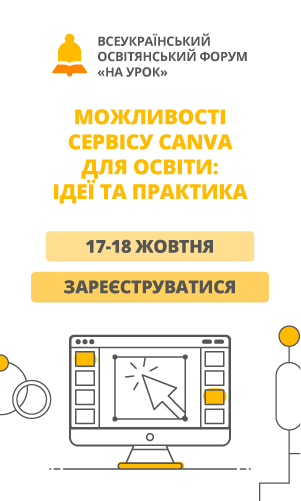

про публікацію авторської розробки
Додати розробку














